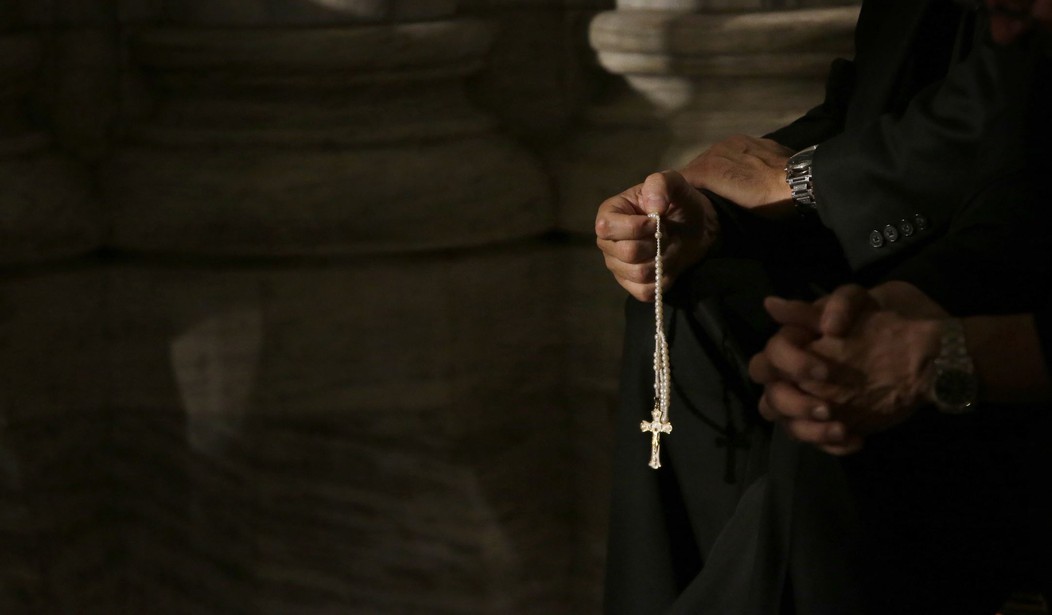Skeptics and atheists insist that belief in God is irrational. All too many believers in God, due to the same theological illiteracy affecting the non-believers and unbelievers, lend credence to this charge by way of their inability and/or unwillingness to defend their belief in God.
Thankfully, there has been no short supply of men of genius over the centuries who have shown that there is nothing at all irrational about theism.
In fact, some, like the 12th century theologian and philosopher Anselm of Canterbury (1033-1109), were at pains to establish that it is atheism that’s irrational.
By way of the “ontological argument” for which he is famous, Anselm tried to show that the atheist doesn’t just happen to be wrong, but is necessarily wrong, for atheism is self-contradictory, and a self-contradiction is always false. For example, since the proposition, “Bachelors are not unmarried men” contradicts the very definition of a bachelor, it doesn’t just happen to be false; it must always be false.
The ontological argument is an argument from definition. Anselm’s version of it goes something like this:
God must be, because it is greater to be than to not be and God is, by definition, the greatest conceivable being.
Consider: Everyone, regardless of whether or not they believe in God, knows that, in theory, God is an infinite and perfect being. Insofar as He is infinite, He is a being without either a beginning or an end. And insofar as He is perfect, He is changeless, for any and every change is for either the better or the worse. But God, given His perfection, can neither regress nor progress. Thus, God must be immutable.
Recommended
What this means is that God, in theory, can’t be dependent upon anything else. Nothing brought Him into existence (for there couldn’t be a time when He didn’t exist), nothing can alter Him in any way (for He is changeless), and nothing could extinguish His existence.
Simply put, God must exist. He doesn’t just happen to exist, like you, me, and everything else in our experience. God, by definition, in theory, necessarily exists.
So, the atheist is guilty of absurdity: “God does not exist” is the same proposition as, “The Being that necessarily exists, the Being that cannot not exist, does not exist!”
There have been many other arguments, or “proofs,” for God’s existence. What is typically known as “the argument from contingency” is another with a long history.
Whatever is contingent is dependent upon other things for its existence. This would include everything and anything that has ever actually existed within the spatial-temporal universe, as well as almost anything and everything that we could imagine. Human beings; animals; plants; insects; buildings; cars; planets; stars; Superman; King Kong; Santa Claus; unicorns—all are alike contingent upon and limited by other beings.
Now, it is logically impossible for there to exist nothing but contingent beings. As the great Thomas Aquinas (1225-1274) noted back in the 13th century, whatever depends upon another for its existence at some juncture did not exist. Think about it: At one point, you did not exist, the laptop upon which I’m typing this did not exist, my home did not exist, the planet Earth did not exist, the sun did not exist, etc. However, what this means is that if the only things to have ever existed are contingent, then since a contingent thing is something that at one point does not exist, then at some point, nothing would have existed.
To repeat: Since whatever depends upon another depends upon that being to bring it into existence, prior to that point it did not exist. Thus, if each thing that ever existed is contingent, then at some point there would’ve been nothing.
But if there was nothing then, there would be nothing now, for from nothing, comes nothing.
Or, if you will, something can’t come from nothing.
Because, then, we know that there are things now, the only conclusion that we can draw is that there is at least one being whose existence is most definitely not dependent upon anything or anyone else.
In order to account for this world of mutually dependent beings, we must look beyond it to a being that exists, not contingently, but necessarily.
And the only being that fits this description is what most people call “God.”
Why is there something rather than nothing? This question cannot be answered by referring to things—contingent things—within the universe. What we call “the universe” is the thing, the “something,” that we’re trying to explain, after all, and the universe is simply the sum total of all of its members, i.e. all of its contingent parts. Whether it is one contingent being or an infinity of contingent beings, whatever is contingent points beyond itself to something that is, ultimately, non-contingent.
The universe is not self-explanatory. In the final analysis, only something beyond the universe, something that is not contingent, can account for it.
The third argument for God’s existence that I’d like to consider here is the argument from morality.
Simply put, morality is objective, it is real, only if God exists. Both theists and atheists have conceded this point.
The 20th century French existentialist philosopher, Jean-Paul Sartre (1905-1980), who was both an atheist and a communist, is insistent upon this point. His whole philosophy presupposes it.
Historically, Sartre observed, atheists have thought it possible “to eliminate God as painlessly as possible.” They have thought that “nothing will have changed if God does not exist.” Sartre sums up the atheist’s position. It is the most wishful of wishful thinking to suppose, as atheists have, that we “will encounter the same standards of honesty, progress, and humanism” upon turning “God into an obsolete hypothesis that will die quietly on its own.”
Without God, human beings have no objective moral standards “to cling to,” “no values or orders” that can “legitimize our conduct.”
In summary: If God is not real, neither is morality.

























Join the conversation as a VIP Member